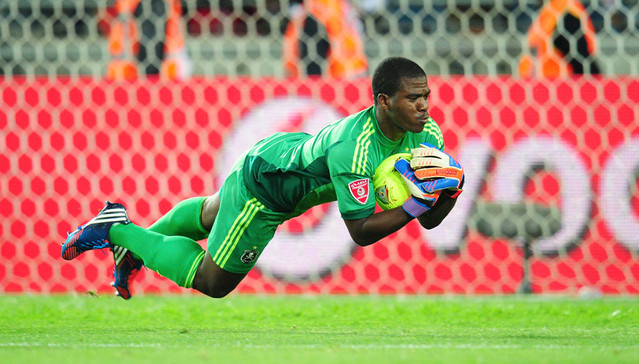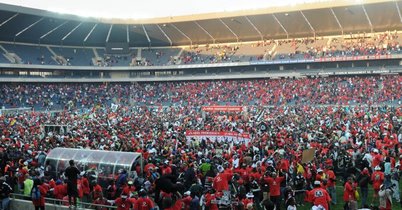Sport has gifted humankind with many unforgettable moments. “The Rumble in the Jungle” showed that tactical ingenuity, not only brawn had a place in boxing. Roger Milla dancing at a corner flag after yet another goal in the 1990 World Cup signaled African football’s arrival on the world stage. The drive and determination of Queen Serena’s reign will inspire many generations to come.
The 2016/17 PSL season in South Africa doesn’t usually make it on to the “greatest moments in sports” list. But perhaps it should. It gave us an unusual finalist for the 2017 FIFA goal of the year, also known as the Puskas Award.
Oscar Masuluke’s remarkable acrobatic overhead kick goal for Baroka FC against Orlando Pirates in an ABSA Premiership match was an act of pure athletic genius. The context in which it was scored underscores just how extraordinary it was. Baroka FC are relative newcomers to the PSL and hail from the backwaters of the Limpopo province, while Orlando Pirates are the fabled team from the big city.
2017 should have been a festive year for the legendary Pirates as the club celebrated its 80th birthday. It’s been a chequered eight decades of existence for The Mighty Bucs, punctuated by a pioneering spirit, legendary players, historic triumphs, and constant coaching changes. The great team of 1973, which swept all before them, was guided by two different coaches. When Pirates won the African Champions League in 1995, the hot seat was exchanged between Mike Makaab, Joe Frickleton, and the late Ronald Mkhandawire. The double- and treble-plundering sides of 2010/11 and 2011/12 had three different coaches steering the Buccaneers’ ship.
When Pirates faced Baroka on October 31, 2016, they were led by their 6th coach in six years. Pirates had taken the lead in the 48th minute through Justice Chabalala. As the game progressed, the Bucs seemed content to defend a one-goal lead.
Six minutes into stoppage time, Baroka won a corner kick and Masuluke, the lanky Boroka keeper, frantically sprinted forward for a last throw of the dice. Jackson Mabokgwane, the hapless Pirates keeper parried the ball away and it sailed over Masuluke’s head.
The danger seemingly cleared. But the football gods had other ideas. Masuluke executed a perfect bicycle kick, and the ball looped into the top right corner of the Pirates goal.
It was a moment of wonder that has eternally engraved its place in South African sports folklore. Goals like this are as common as Halley’s Comet, hence its nomination for the FIFA Puskas Award. In the end, Olivier Giroud’s “scorpion kick” goal for Arsenal denied Masuluke the honor of becoming the first goalkeeper to win the goal of the year award.
If sport is art, as CLR James famously wrote, then beauty is in the eye of the beholder.
Tag: Orlando Pirates
Just two days after former 800m world champion Mbulaeni Mulaudzi died in a car crash, South Africa mourns the death of another sport celebrity. 27-year-old Senzo Meyiwa, captain of Orlando Pirates and South Africa, was shot and killed on Sunday evening during a robber at his partner’s home in Vosloruus, East Rand.
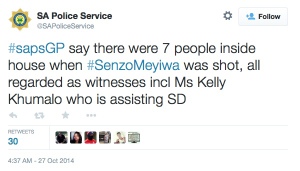 According to initial reports, two armed men entered the home of actress and singer Kelly Khumalo and demanded cash, cell phones, and valuables from seven people. An altercation ensued and one of the assailants shot Meyiwa once in the chest. The player was pronounced dead on arrival at the hospital.
According to initial reports, two armed men entered the home of actress and singer Kelly Khumalo and demanded cash, cell phones, and valuables from seven people. An altercation ensued and one of the assailants shot Meyiwa once in the chest. The player was pronounced dead on arrival at the hospital.
Kick Off magazine reported on its website that “News of the shooting prompted widespread sympathy on social media and condemnation of South Africa’s rampant gun violence.”
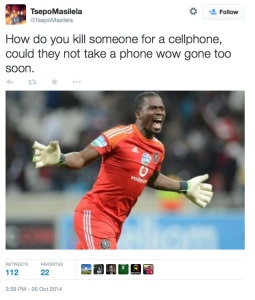 Tsepo Masilela, a Bafana Bafana teammate of Meyiwa’s, seemed to capture the shock of many when he tweeted: “How do you kill someone for a cellphone?”
Tsepo Masilela, a Bafana Bafana teammate of Meyiwa’s, seemed to capture the shock of many when he tweeted: “How do you kill someone for a cellphone?”
The South African Police Service (@SAPoliceService) offered a R150,000 reward for information leading to an arrest.
Chris Thurman, an academic and editor of Sport versus Art, summed up the horrible past days for sport in South Africa via Twitter: “RIP Mbulaeni Mulaudzi & Senzo Meyiwa. Men who offered South Africans two of the best features of our story, struck down by two of the worst.”
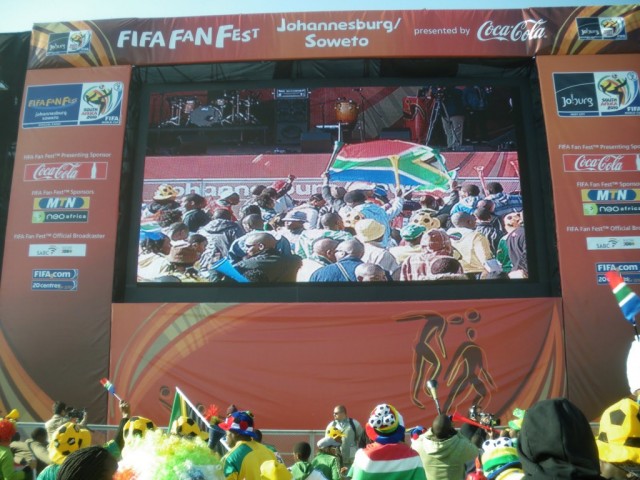
Quinton Fortune played seven seasons with Manchester United and 46 times for South Africa. On September 23, he wrote an excellent piece in The Guardian about a topic dear to me and to many readers of this blog: the impact of the 2010 World Cup on the growth and development of South African football.
Given the billions of rands spent on new and revamped stadiums and transport infrastructure, Fortune asks, was hosting the tournament a boon for the local game? “Judging by the poor attendances at top-flight games not involving the country’s two most popular clubs, Kaizer Chiefs and Orlando Pirates, who are also by far the most powerful in financial terms, and the poor performances of the national team Bafana Bafana, the answer unfortunately has to be a resounding ‘no’,” Fortune writes.
His concerns are numerous, important, and inter-related. The World Cup, Fortune asserts, did nothing to alter the Chiefs-Pirates duopoly, which continues to capture the lion’s share of the attention from fans, media, and sponsorship money. He points out that the quality of play in the Premier Soccer League is not terribly good, as evidenced by last year’s top scorer, Bernard Parker, boasting a meager 10 goals.
Fortune then notes how the swanky World Cup stadiums in Cape Town, Nelspruit, Polokwane, and Port Elizabeth are now massive financial drains on local municipalities struggling to deal with many pressing social needs in perhaps the most unequal country in the world.
The former Man United midfielder does not spare the PSL’s satellite broadcaster, SuperSport, which bankrolls the South African league while offering 24/7 matches and highlights of European football (such as EPL, La Liga, Serie A, Champions League). This contradiction is another reason why the PSL is “losing fans who prefer to watch the football from the comfort of their homes, receiving high definition pictures, while also having a choice of watching (better quality) football from other parts of the world,” says Fortune.
The way forward, Fortune concludes, requires harnessing South Africa’s world-class infrastructure and abundance of football talent to forge “a well-planned development programme which will develop that talent into realising its full potential.” How this should be done is the challenging part.
By Mohlomi Maubane
SOWETO, South Africa — “Why the f**k did he not do that at West Ham!!!” reads a YouTube comment in response to the video clip above featuring Benni McCarthy’s superb free kick in the 2011 Telkom Cup quarterfinal between Orlando Pirates and Moroka Swallows. This is the best goal I have seen in the PSL era: an extraordinary strike in a tense match Pirates were losing by a goal to nil. And while Swallows players were still scratching their heads in bewilderment, he got a second and sealed the match.
West Ham were the last European team McCarthy played for in a chequered 14-year European career whose highlight was a 2004 UEFA Champions League medal with FC Porto under Jose Mourinho. A sometimes controversial character who had endless run-ins with the South African Football Association, Benni set tongues wagging in the local football scene when he decided to return to South Africa. Some critics believed he was over the hill while others knew he still had something to offer. The man himself said he still had a lot of football in him, and with the right service, he would excel. At Orlando Pirates, he found the perfect setting to shine although he would have to do it without Dutch coach Ruud Krol who had just left after three years at the helm.
The Mighty Bucs boasted one of the best squads in the country and were brimming with confidence after winning a treble the previous season. Krol’s long term (at least in South African terms) afforded him the required time to build a team and mould plentiful talent in service of the collective. Team-play became paramount above all else, and prima donnas were booted out. The defense became mean. Opponents learned the hard way that beating Pirates meant playing to the final whistle. For example, in a November league game against Swallows. The Dube Birds looked set for a 1-0 victory, but as my friend Katiso Motaung wryly noted, Pirates managed to turn defense into attack and Jele equalized in the nanoseconds it took the referee to lift the whistle to his mouth to blow full time.
Benni Leads Orlando Pirates to PSL Title
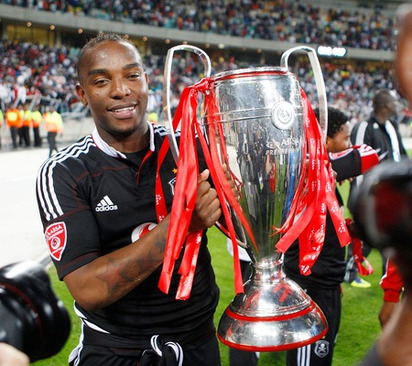 Benni McCarthy’s two second-half goals earned Orlando Pirates their second consecutive Premier Soccer League title. It was sweet revenge for McCarthy writes Rodney Reiners in the Cape Argus, “He’s been put down, trampled on, ridiculed, and dismissed as an over-weight, over-rated charlatan more often than any footballer should have to endure. Yet, each time, the 34-year-old Cape Town-born striker has come back to splatter copious bowls of beaten egg on the faces of his critics.”
Benni McCarthy’s two second-half goals earned Orlando Pirates their second consecutive Premier Soccer League title. It was sweet revenge for McCarthy writes Rodney Reiners in the Cape Argus, “He’s been put down, trampled on, ridiculed, and dismissed as an over-weight, over-rated charlatan more often than any footballer should have to endure. Yet, each time, the 34-year-old Cape Town-born striker has come back to splatter copious bowls of beaten egg on the faces of his critics.”
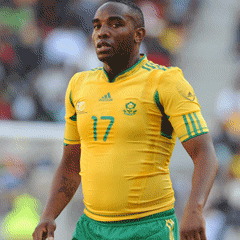 McCarthy — the most prolific scorer in Bafana Bafana’s history — has experienced a rebirth since the humiliation of being left off the 2010 World Cup squad for lack of fitness (see photo).
McCarthy — the most prolific scorer in Bafana Bafana’s history — has experienced a rebirth since the humiliation of being left off the 2010 World Cup squad for lack of fitness (see photo).
Pirates went into the tense closing Saturday with a two-point lead over Soweto rivals Moroka Swallows. Both contenders took care of business in their away matches in KwaZulu-Natal: Bucs beating Golden Arrows 4-2 at Durban’s monumental but seldom-used Moses Mabhida stadium (highlights here); The Birds winning 1-0 at Maritzburg United’s more humble and intimate Harry Gwala stadium.
Smiling broadly, Benni McCarthy told Ryan Cooper of Kick Off magazine: “I’m doing the thing I love most, and that is playing football. The haters out there . . . next year I’m gonna keep coming back with more!”
Goal of the Week: South African bicycle
By Simone Poliandri
Orlando Pirates striker Benni McCarthy scored the winning goal against Maritzburg United with a spectacular bicycle kick in the 75th minute. The game, played at Orlando Stadium on Sunday, February 25, saw Pirates prevail 1-0. The win placed Pirates level with second-placed Kaizer Chiefs on 33 points, just three behind leaders Sundowns in the Premier Soccer League of South Africa. McCarthy dedicated his fabulous goal to ailing former president Nelson Mandela.
The Mighty Bucs Reign Supreme
By Mohlomi Maubane in Soweto, South Africa
A few days before the 2010 World Cup kicked off in South Africa, the New York Times Magazine published an insightful piece on football development focused on Ajax Amsterdam’s famous youth academy. “How a Soccer Star is Made” by Michael Sokolove is a must read for the myopic beings who masquerade as the game’s sole custodians in South Africa and who have turned fiddling while Rome burns into an art. I was reminded of the NYT article during this past weekend’s dramatic finish of the 2010-2011 PSL season.
In the story, Sokolove recounts his encounter with David Endt, manager of the Ajax first team and a former Ajax player. Endt also serves as the team’s unofficial conscience and historian. His office is a mini-museum and on his desk was a pair of scissors, once allegedly used by an Ajax player to attack a teammate in a dressing room squabble a few decades back.
If Orlando Pirates — the Soweto giants crowned PSL champions on Saturday — had a museum, the orange shirt of one of Ajax’s most decorated products would find a place in it. For months, Pirates’ coach Ruud Krol’s bright shirt has been the source of jokes among many soccer scribes in South Africa. However, for Krol, who played 339 games for Ajax and 83 times for The Netherlands (including two World Cup finals), the orange shirt was no laughing matter. Not only is orange his national colour, but it was also a good luck omen. And you sure need a dose of good luck to stay at the helm of the Mighty Bucs.
The last two times Pirates were crowned league champions, the victorious coaches were fired early in the following season. A manager can win the league at Pirates, but if the side is deemed not to be suitably entertaining then he will “part ways with the team amicably.” For all its fascination with the English game, the South African football fraternity has not learned some important lessons from it.
Alex Ferguson has been to these shores three times with his Red Devils in the past twenty years. In that same period, Pirates have employed over thirty head coaches, none serving longer than Krol’s three years. Needless to say, the constant chopping and changing had a negative effect on the team’s performance. Success has come in dribs and drabs, and when the 2010-2011 season started, Pirates had not won a major tournament in eight years.
That ghost was laid to rest in October 2010 as Pirates annexed the MTN 8. At Pirates, however, winning a trophy is a double-edged sword. It does offer some reprieve, but it also heightens expectations. And so when Krol guided the Mighty Bucs to the Telkom Cup final only to lose brutally 3-1 to bitter Soweto rivals Kaizer Chiefs, his head was on the chopping block. In fact, Krol’s head has been on the block every time a point was dropped. But in retrospect, that Telkom Cup derby was the turning point in the Pirates’ season.
In a May 23 radio interview, Krol revealed that at the first training session after the loss to Chiefs in December, he called his players around and told them that, painful as it was, that was not the last loss they were going to suffer in their careers. And anyway, the season was far from over, what was important was how they were going to finish at the end of the season. The team duly heeded his call and went on a sixteen-game unbeaten spree, with Krol egging them on from the sidelines reliably clad in his lucky orange shirt.
With five league matches left to play, Pirates Nation prematurely predicted that “We are going to win the league,” despite several other teams being in the title chase. A 3-0 drubbing by Ajax Cape Town — a club founded in 1999 as a joint venture between Ajax Amsterdam and a South African group — ended the Bucs’ unbeaten run on March 16 . Suddenly, being crowned champions did not look like a foregone conclusion. Pirates won the next two games so that with three games left four teams — Pirates, Chiefs, Ajax, and Sundowns — had a chance to win the league. This was no time to blink.
But Pirates blinked. They lost 1-0 to Supersport at home, and needed a 92nd minute equalizer to draw 1-1 away at Santos. On the final day of the season, the team’s destiny was not in their hands. A win against Maritzburg United at home would hand Ajax Cape Town their first league title. If Ajax drew and Pirates won, however, Pirates would be the champions on goal difference. There was also the small matter of a so-called dark horse in the form of Kaizer Chiefs, arithmetically still in the running.
Despite my initial boycott of PSL games due to the cover charge being doubled at the beginning of the season, I have regularly attended Pirates’ games at Orlando Stadium this season. However, I could not conjure up the courage to go to the stadium for the deciding match this past Saturday for fear of having my heart broken into a million pieces. Too painful to imagine.
But somehow, someway, Ajax failed to muster a win. They led 1-0 at the break, only for Maritzburg to claw their way back finding an equalizer and, lo and behold, taking the lead midway through the second half. Meanwhile in Soweto, Golden Arrows were holding Pirates to a 1-1 draw. Then, in the 84th minute, Isaac Chansa let rip from outside the box with a scorcher of a goal. At Cape Town Stadium, three minutes later, Ajax drew level. One more goal and Ajax would win the title.
It was not to be. Ezimnyama Ngenkani held on and were crowned champions in the most dramatic fashion since the PSL began in 1996-97. When the referee blew the final whistle at Orlando Stadium, he signaled the start of wild celebrations. Thousands of Buccaneer supporters ran onto the pitch to mob Krol. The Dutch coach may not know that supporters mobbed many of his predecessors in years gone by, usually after an undesired result when the messages being passed on were nothing like the pearls of affection lavished on Krol on Saturday.
South Africa in general, and its football fraternity in particular, should learn from Krol’s sojourn at Pirates. As famed playwright Athol Fugard recently reiterated, we pay scant respect to growth: “Everything must be instant — instant sex, instant coffee, instant satisfaction. Nobody is prepared to plant a seed and wait.” There are no short cuts to success. Let’s plant seeds, nurture them, and let them grow. It’s the only recipe for long-term success, and it is the lesson we must learn from Krol’s success with Pirates.
And that orange shirt, which was missing two buttons after the melee at Orlando Stadium, must be framed and hung in the office of the Orlando Pirates Chairman. Football, bloody hell!!
